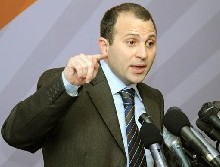 Lebanese Energy Minister Gebran Bassil said new estimates for nearly half of Lebanese waters suggested the country’s reserves of natural gas and oil might be larger than previously thought.
Lebanese Energy Minister Gebran Bassil said new estimates for nearly half of Lebanese waters suggested the country’s reserves of natural gas and oil might be larger than previously thought.
“The current estimate, under a probability of 50 percent, for almost 45 percent of our waters has reached 95.9 trillion cubic feet of gas and 865 million barrels of oil,” he said.
The estimates are based on seismic surveys conducted ahead of an auction for exploration rights which has already been delayed by several months by a political stalemate in Lebanon.
As Lebanon prepares to move toward exploring and developing its offshore oil and gas resources, Bassil said he hoped that hydrocarbon revenues would give the country “political, economic and financial independence”.
“This definitely needs more exploration and drilling activities to get more precise figures, but this is an indication that with more work surveys and analyses, we are getting higher results and higher expectations,” he said in an interview at the Reuters Middle East Investment Summit.
The figures are the first estimates by the government for such a large area of Lebanon’s 10 exploration blocs, which range from 1,500 to 2,500 square kilometres, and appear to imply higher reserves than several previous estimates.
A 2010 U.S. Geological Survey study estimated that the Levantine Basin, an area of 83,000 square km which includes waters outside Lebanon’s jurisdiction in the eastern Mediterranean, held 122 trillion cubic feet of recoverable natural gas and 1.7 billion barrels of recoverable oil.
An analyst at survey firm Spectrum estimated in May that the country’s total deepwater gas reserves could be up to 80 trillion cubic feet.
DEBT, POWER SHORTAGES
Lebanon has been hoping that sizeable gas discoveries could help address both its high level of government debt and its chronic domestic power shortages.
But progress will be difficult given the country’s political turmoil, after Prime Minister Najib Mikati resigned in March amid partisan squabbling that has stalled most government decisions.
Earlier this month, Bassil said he had delayed Lebanon’s offshore gas licensing round by another month until January after politicians failed to form a new government, which is needed to approve decrees to launch the bidding process.
Without approval of those documents, Lebanon’s efforts to exploit maritime reserves are on hold and 46 companies it selected in April to bid for gas exploration will have to wait.
Bassil said that although no companies had formally withdrawn from the bidding round because of the delays, some were “hesitant and there are questions being raised”.
Drilling could also be delayed in southern exploration blocs by disputes over a maritime border between Lebanon and Israel that has never been delineated because the two countries are technically at war.
Bassil warned in July that Israel had the technical ability to draw from Lebanese underwater gas fields. Israel’s Energy Ministry declined to comment on Bassil’s remarks.
In addition to the tensions within Lebanon’s cabinet, economic activity in the country has been hurt by a spillover of sectarian violence from the Syrian civil war next door; clashes continued on Sunday in the Lebanese coastal city of Tripoli.
Separately, Bassil said an onshore oil and gas survey was moving ahead as planned, in the hope that surveys of Lebanon’s Mediterranean waters could be matched by similar prospects on land.
He said one of five 2-D seismic surveys had been completed and a second was to start next week.
Reuters

Leave a Reply
You must be logged in to post a comment.